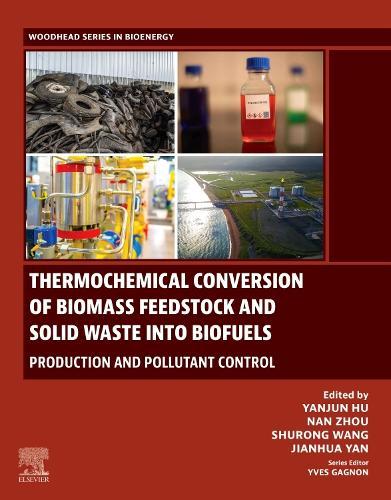Overview
Thermochemical Conversion of Biomass Feedstock and Solid Waste into Biofuels: Production and Pollutant Control offers a comprehensive overview of the state-of-the-art in biofuel production with a special focus on pollutants control, which is both necessary and beneficial for the target audience and the development of this research field. Biofuel is currently a major trend due to the existing environmental crises and global energy challenges. Developing sustainable biofuels from biomass feedstock and solid waste, along with minimizing the formation of pollutants during the conversion processes are currently of significant academic and industrial importance, drawing widespread attention. Novel processes, reactions, and catalysts are being rapidly developed, and compiling this information is invaluable for keeping the audience informed and up-to-date. In addition, while research on the formation and transformation of pollutants such as heavy metals, chlorine, nitrogen, and sulfur species are often conducted by environmental scientists and engineers, it is less familiar to bioenergy researchers. This book aims to bridge the gap between relevant disciplines and presents a comprehensive overview of the entire research field.
Full Product Details
Author: Yanjun Hu (Science and Education Integration College of Energy and Carbon Neutralization, Zhejiang University of Technology, Hangzhou, P.R. China) ,
Nan Zhou (Science and Education Integration College of Energy and Carbon Neutralization, Zhejiang University of Technology, Hangzhou, P.R. China) ,
Shurong Wang (College of Energy Engineering, Zhejiang University, Hangzhou, P.R. China) ,
Jianhua Yan (College of Energy Engineering, Zhejiang University, Hangzhou, P.R. China)
Publisher: Elsevier - Health Sciences Division
Imprint: Woodhead Publishing
Weight: 1.000kg
ISBN: 9780443292910
ISBN 10: 0443292914
Pages: 378
Publication Date: 03 June 2025
Audience:
College/higher education
,
Professional and scholarly
,
Postgraduate, Research & Scholarly
,
Professional & Vocational
Format: Paperback
Publisher's Status: Active
Availability: Manufactured on demand

We will order this item for you from a manufactured on demand supplier.
Author Information
Prof. Yanjun Hu is the Director, Professor, and Doctoral supervisor of the Institute of Energy and Power Engineering in School of Mechanical Engineering, Zhejiang University of Technology. In March 2009, she obtained a doctor's degree in thermal engineering from Tianjin University. She engaged in the research area on the thermal conversion technology and theory of multi-source organic solid waste, with specific research directions including collaborative pyrolysis/gasification/combustion of multi-source organic solid waste, generation and control of heavy metals and organic pollutants during thermal treatment, and reutilization of incineration residue resources. She has published more than 50 high-level academic papers as the first author and corresponding author, and many papers have been published in international journals in the field of energy and environment. Dr. Nan Zhou is an Assistant Professor at the Institute of Energy and Power Engineering in the School of Mechanical Engineering at Zhejiang University of Technology. He earned his Ph.D. in Bioproducts and Biosystems Engineering from the University of Minnesota, USA, in 2021, and his B.S. in Energy and Power Engineering from Xi'an Jiaotong University, China, in 2013. Dr. Zhou's research focuses on the thermochemical conversion of biomass and solid wastes into fuels, chemicals, and materials. His specific interests include the mechanisms and process scale-up of microwave-assisted pyrolysis, catalysis for the chemical recycling of plastics, and the catalytic upgrading for biofuel production. He has authored over 70 peer-reviewed papers in international journals, including Progress in Energy and Combustion Science, Applied Catalysis B: Environment, Chemical Engineering Journal, and Bioresource Technology. Two of his publications are recognized as ESI Highly Cited Papers. Dr. Zhou has a Google Scholar h-index of 37 and serves as a guest editor for several journals and a reviewer for over 10 SCI journals. Prof. Shurong Wang is a Distinguished Professor at Zhejiang University. He obtained the National Science Fund for Distinguished Young Scholars in 2017 and Leading Talent of Technological Innovation of Ten-Thousands Talents Program in 2019. He has been successfully awarded as ""Young and Middle-aged Leading Talent in Science and Technology innovation (Ministry of Science and Technology)"", ""New Century Excellent Talent in University of China"", the first level of ""Zhejiang Provincial New Century 151 Talent"" and ""Highly Cited Chinese Researcher of Elsevier"". His research focus includes (1) Thermal conversion of biomass and municipal solid waste; (2) Efficient synthesis and application of zero-carbon fuel (3) Preparation and application of functional materials for energy conversion/storage; (4) Adsorption and utilization of carbon dioxide (5) Evaluation of renewable energy conversion processes. Prof. Jianhua Yan is a Vice President of Zhejiang University since 2016. He was awarded as Cheung Kong Scholar in China owing to his significant academic contribution to the field of waste-to-energy technology. His research interests focus on the clean and efficient incineration of solid wastes, incineration pollution control, and sustainable treatment and utilization of incineration ash. He has developed clean incineration technologies for municipal solid waste, integrated technologies of sludge drying and incineration, dioxin emission control and online measurement technologies. He established the first dioxin analytical laboratory in China in 2005. He has published over 400 peer-reviewed journal papers, 8 books and 67 invention patents. He is the founder and editor-in-chief of Waste Disposal & Sustainable Energy. In addition, as the first author, he won the second prize of the National Scientific and Technological Progress Award in China.



